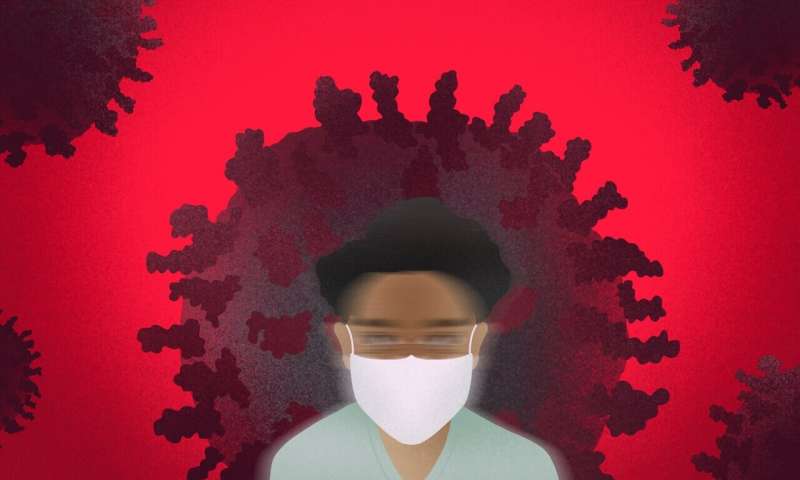Infecting the mind: Burnout in health care workers during COVID-19

Doctors and nurses across the country are experiencing occupational burnout and fatigue from the increased stress caused by the COVID-19 pandemic. A team of researchers and medical professionals at Texas A&M University and Houston Methodist Hospital are working together to fight two afflictions: COVID-19 and the mental strain experienced by medical professionals.
In an article recently published in the journal Anesthesia & Analgesia, Dr. Farzan Sasangohar, assistant professor in the Department of Industrial and Systems Engineering and colleagues at Houston Methodist Hospital, outline the effects of fatigue and burnout on intensive care unit (ICU) workers, and the steps that can be taken to mitigate these symptoms.
"The COVID-19 pandemic exacerbated an already existing problem within our health care systems and is exposing the pernicious implications of provider burnout," Sasangohar said.
Health care workers are experiencing added stress from multiple areas. Many of them are working longer shifts and experiencing more loss of life. The lack of personal protective equipment (PPE) and training on how to use new equipment causes many professionals to question if they have been exposed. This leads to fear that they could infect their family and loved ones. In addition to those fears, there is anxiety surrounding job security. To reduce the spread of infection, many states have stopped elective procedures and consequently, many health care professionals have been laid off or had their hours reduced.
Sasangohar and the research team documented four major areas of stress with the goal of identifying mitigation strategies to reduce burnout among these life-saving workers. The four areas identified by the researchers include occupational hazards, national versus locally scaled responses, process inefficiencies and financial instability.
The symptoms
Health care workers need effective PPE readily accessible and available to ensure their safety and that of their patients. Getting the necessary equipment has been challenging due to the low numbers of PPE and ventilators in the U.S. Strategic National Stockpile and delays getting equipment into local areas. This slow response, which has caused some providers to reuse PPE past the point of safety and warranty protections, can contribute to anxiety in providers.
"Minimizing occupational hazard is the most important criteria to assure that our health care workforce is fully equipped and assured to be safe in order to face the battle against this virus," said Dr. Bita Kash, professor of health policy and management in the Texas A&M School of Public Health and director of the Joint Center for Outcomes Research at Houston Methodist Hospital.
The process to secure assistance from federal authorities has been cumbersome and slow for providers. Many requests for additional ventilators and PPE are not being met. These uncertainties about when assistance will arrive has resulted in widespread anxiety among providers.
Process inefficiencies have also contributed to fatigue and burnout due to misinformation or conflicting information given between different specialties. While one subspecialty's professional organization recommends a certain guideline, another specialty could recommend something else, which leads to confusion.
Anxiety and worry about future career prospects and the overall economy can also lead to provider burnout. Elective surgeries have been canceled or delayed, causing financial stress on some physicians. Others not directly affected by financial hardship may be worried about loved ones or their own family and how they will weather a coming economic recession.
Prescription for the future
While this is the first world-wide pandemic in many years, there will be more. Working together, local researchers, health care professionals and government officials can prepare for future pandemics and subsequent waves of the COVID-19 pandemic. Houston Methodist Hospital has already begun learning from this pandemic and making changes to be more resilient in response to the current crisis and prepared for similar crises in the future.
In response to the pandemic, Houston Methodist Hospital adapted their policies and focused on constant and responsive communication from leadership to their employees. Proactive and positive responses have allowed the hospital to adapt quickly during the pandemic and reduce employee stress overall. This success has led to recommendations for future preparations.
The researchers' recommendations to reduce provider burnout and fatigue:
- Pandemic plans should include guidance for relevant industries to quickly transition into producing needed medical supplies
- National and regional disaster mitigation plans to help shorten the time needed to provide necessary equipment and testing
- Provision of adequate numbers of test kits and PPE
- Training on disaster management and response for medical professionals
- Relaxing licensing restrictions for individuals licensed outside their state of residence
- Creating a medical reserve corps of these licensed individuals
- Using wearable sensors to monitor health care workers' mental health and provide simple ways to mitigate anxiety and stress
"There is much to learn from the response to COVID-19," said Sasangohar. "In our approach, we used a multi-disciplinary systems approach to learn not just from failures and shortcomings, but also from successful adaptations and improvised interventions at the individual, team and system levels to improve our resilience."
While ICU workers in Houston have weathered many storms, including Hurricanes Ike and Harvey, the COVID-19 pandemic has brought new challenges to already challenging work. The areas identified by the researchers can help make this work safer, more effective and reduce burnout in these critical roles.
More information: Farzan Sasangohar et al, Provider Burnout and Fatigue During the COVID-19 Pandemic, Anesthesia & Analgesia (2020). DOI: 10.1213/ANE.0000000000004866



















